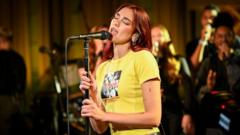In an unprecedented move, prominent musicians such as Elton John and Dua Lipa are leading a charge aimed at reforming copyright laws to shield their work from the encroaching threat of artificial intelligence. The initiative, supported by over 400 British artists—ranging from Sir Ian McKellen to Florence Welch—is encapsulated in a letter addressed to Prime Minister Sir Keir Starmer. The artists assert that without these legal safeguards, they risk effectively surrendering their intellectual property to major tech corporations.
The collective, which includes renowned figures such as author Kazuo Ishiguro and playwright David Hare, has expressed concerns that the lack of protections will not only limit individual creators but also jeopardize the UK’s status as a creative hub. They are advocating for an amendment to the Data (Use and Access) Bill that mandates developers disclose their intentions regarding copyright material used for training AI systems.
"We are wealth creators," the letter states, emphasizing the cultural and financial significance of artists in society. They argue that AI development should not thrive at the expense of human creativity, succinctly capturing the sentiment of the artistic community.
A government spokesperson responded, emphasizing their commitment to nurturing both the creative industries and AI sectors. However, Julia Willemyns from the Centre for British Progress criticized the proposed measures, claiming they could impede the UK’s growth and innovation in the tech landscape.
Concerns regarding the treatment of artistic works in AI training data have intensified, especially as generative AI technology gains traction. Following protests against earlier copyright proposals, including a silent album released by artists like Annie Lennox, there is a palpable apprehension within the creative community about potential exploitation.
Despite pushback, Baroness Beeban Kidron champions a pathway to mutual licensing arrangements between AI developers and content creators, arguing that transparency is vital for a thriving creative economy. The call for reform arrives amid ongoing delays in government consultations, with critics urging a careful review to ensure a fair and balanced approach is achieved.
The assurance from the government about producing an economic impact assessment demonstrates a recognition of the complexities involved in this debate. With growing calls for action from artists and a reconsideration of copyright frameworks, the outcome could significantly affect the future of creativity in the age of artificial intelligence.




















